
· Excerpt
· Editor’s Comments
· Other Comments
· Find Out More
· Locate a Copy
Excerpt
- For as much of the time as possible, we shut ourselves up in our notations and refuse to come out. It’s when we are forced to observe and think afresh that the discrepancy between this simplicity and that complexity overwhelms us.
- By our inmost animal nature we are readers. We read the world around us continuously, obsessively, necessarily. Reading our notations is a late specialization of that skill.
- Our reading of the world and our mastery of notations are intimately linked. We read the world in the way that we read a notation — we make sense of it, we place constructions upon it. We see in the way that we speak, by means of selection and simplification. I should like to end up by saying (gnomically, metaphorically) that we read the world by developing from it a kind of notation of itself. You see your hand by seeing it as a hand. You see the branches of the tree against the blueness of the sky by seeing that the branches of the tree are against the blueness of the sky. I say to you (in all the relative simplicity of the language notation), “The leaves on the tree are shaking in the wind,” and, given a context, you take the sense of this (directly — you don’t have to form a mental picture to understand what I say). There is an unremarked parallel between what you do here and what you do when you look at the tree yourself, in all the immeasurable complexity of the natural world, and (without formulating any thought in words) take the sense that its laves are shaking in the wind.
- We are significance-seeking organisms.
We seek out significance from our environment as we seek out food. We crave meaning as we crave warmth.
If we didn’t find significance and meaning we shouldn’t find food or warmth, either. - We look at the taciturn, inscrutable universe, and cry, “Speak to me!”
Editor’s Comments
- The complexity of the universe is beyond expression in any possible notation.
Lift up your eyes. Not even what you see before you can ever be fully expressed.
Close your eyes. Not even what you see now.
This is the first of the 309 statements — most just a few sentences long, none more than a few paragraphs — that comprise Constructions. Published just a year after Sweet Dreams, Constructions was practically guaranteed to vanish with barely a trace soon after its few copies hit the book stores. Works of philosophy written by philosophers go almost unnoticed outside a few academic circles, and works of philosophy written by non-philosophers rarely even qualify for that, unless they’re a once a generation fluke like Zen and the Art of Motorcycle Maintenance (published, coincidentally, within weeks of Constructions). The problem is that such a work isn’t “serious” enough in the eyes of the philosophy professionals, but it’s too serious for the reading public. Combine these drawbacks with a completely unsexy cover (nothing but text!) and an obscure publishing house, and neglect is assured.
I must admit that I only special-ordered my copy of Constructions, back in the late 1970s when Wildwood House still had a few copies in stock, in hopes that it might have something of the flavor of Sweet Dreams. To that extent, I was confirming a view of the reading public Frayn himself offered a few decades later:
The only advice that I could think of giving to a young writer is to write the same thing over and over again, changing things very slightly and going on delivering it until people accept it. Very simply, people want reliability and continuity in a writer. If you buy cornflakes you want cornflakes.
Well, Constructions is most definitely NOT the cornflakes of Sweet Dreams, at least not at first glance. And so, after thumbing through a few pages, I stuck it into the bookcase. And aside from a dozen transfers to and from moving boxes, there it remained for the next 25 years.
It was after reading Ray Monk’s wonderful biography of Wittgenstein that I finally gave Constructions another try. I knew I’d read something similar to Wittgenstein’s precisely numbered and aphoristic philosophical statements, and some digging into the unpacked book boxes soon produced it. The pages might have been a bit weathered, like aged newsprint, but my copy was just as crisp and undiscovered as it was upon delivery.
It will not serve Constructions very well with professional philosophers to describe it as a poor man’s substitute for Wittgenstein, but in my case, that’s what it was. I couldn’t get past 3 point something in Tractatus Logico Philosophicus. Yet I think Frayn’s opening construction above is not that far removed from Wittgenstein’s attempt “to draw a limit to thought — or rather, not to thought, but to the expression of thoughts….” I also have a feeling Wittgenstein would not disagree with Frayn’s answer to the question, “Is there an order in the universe?”: “There are orders. And disorders” [#233].
Like Wittgenstein, Frayn sees language as the key with which both we unlock the world and lock off the world that falls outside language:
- You can translate out of the German, or out of the Aramaic. But only into another language! Not into the world of which the language treats!
Moving from one myth to another is in some ways a little like translating between languages. A particular language has its own idioms, its own voice; a topography which favours certain ways of speaking, and makes others awkward.
These differences ensure there is always a certain amount of miscommunication and confusion inherent in any exchange between people of different tongues. This tendency towards miscommunication is one of Frayn’s favorite themes, going back to his earliest novels (The Tin Men and The Russian Interpreter). “Even if lions could speak, we couldn’t understand them,” Wittgenstein once wrote. For Frayn, one doesn’t have to leave our own species to encounter this problem.
Construction #248 offers an illustration of this, one he would later develop into one of the major themes of his play, “Benefactors”:
The people who move us from myth to myth are like the reformers who hoped to cure all social ills by taking people out of the slums, which were the context of their diseases and crimes, and installing them in new, disease- and crime-free housing estates. It was a terrible blow to discover that these estates in their turn developed a characteristic pattern of social disorder.
“What is your aim in philosophy? To shew the fly the way out of the fly-bottle,” Wittgenstein wrote in #309 (another coincidence) of his Philosophical Investigations. Frayn is skeptical of mankind’s ability to escape the fly-bottle. Our fascination with the truth that lies hidden at the heart of things is, in his view, one of the handicaps that guarantees our continued captivity:
- … It’s true that in life people sometimes do surprise us at such moments [of stress and crisis], by revealing flaws or virtues we had not known about before….
… But in most cases the truth that is revealed about us by our behavior in a crisis is just this: the truth about our behavior in a crisis.
Which leads him to this droll, quite un-Wittgenstein-ian parable:
- The secret police arrest us all. I, who have been a well-mannered and amusing guest at your dinner parties these past ten years, betray you as soon as they show me the electrodes. That bore Puling refuses, heroically.
If ever we all get out again, don’t make the mistake of inviting him to your dinner parties instead of me.
To Frayn, the fly-bottle is what makes us human, rather than something else. We cannot get outside it:
- What would we be like if we put all our roles off, and emerged from behind them? We smile and stretch, reborn, untrammelled: Now we are playing the role of one who has put his roles off.
Frayn is nothing if not an elegant writer. Elegant in the sense that the term is used in mathematics: balanced, spare, aesthetically pleasing. Take the efficiency with which he encapsulates these paradoxes:
- Our complexity is such that we can understand many complex things. But not our own complexity!
- A capacious suitcase. We can get everything we want in it: clothes, books, a folding table, a bed, a bicycle…. This suitcase is infinitely flexible! The only thing we can’t get in is the suitcase itself.
I suppose that a professional philosopher could easily demonstrate that most of Frayn’s constructions are derivatives — and low-quality ones — of statements made by Wittgenstein and other thinkers from Pascal to A.J. Ayer. So I feel I am in no position to justify the merits of Constructions as philosophy. Recent scientific research does suggest that there is some truth to Frayn’s statement that “We read the world in the way that we read a notation” than he may have suspected. Mark Changizi and other scientists, as reported in The American Naturalist, found that “… visual signs have been culturally selected to match the kinds of conglomeration of contours found in natural scenes because that is what we have evolved to be good at visually processing.” In other words, it appears our notations themselves derive from the way we read the world.
But Constructions couldn’t make the grade as “serious” philosophy in 1974, so it probably stands little better chance of making it on this basis today. It may not help us know how to think or what to think, but it certainly does stimulate us to think.
“[T]he glory of writing is its dependence upon the world — the necessity it puts us in of coming back again and again to confront the complexity of what lies before our eyes” [#308]. And to that extent, this slight sliver volume, long out of print, qualifies as a glorious book. A dip into just a few of its pages always serves to remind me of the complexity what lies before my eyes; my own limitations in grasping it — but also my infinite opportunities to try to. Having finally worked through its unnumbered pages, I find I turn to it often to remind myself of the never-ending paradox of trying to understand the world around me.
Thirty-two years after Constructions, Frayn published another foray into the world of philosophy. At four times the length of Constructions, The Human Touch has already managed to attract more reviews and cross the Atlantic, with a U.S. edition coming out in early 2007, but this is certainly due to the growth in Frayn’s reputation since 1974.
Other Comments
- · Jonathan Raban, “Is God a Novelist,” Sunday Times, 3 November 1974
- These 309 numbered homilies, reveries, and speculations make nods of acknowledgement to Wittgenstein and Pascal, but they are actually the secret marginalia of a novelist who understands how the world works because he has created worlds too.
- · Philip Toynbee, The Observer, 20 October 1974
- Constructions is a fascinating and endlessly thought-provoking little book of a kind which is so difficult to categorize that it might almost be described as unique. It is poetical; it is philosophical (yet almost anti-philosophizing!); and it is a genuine contribution to psychology…. This is not only an unusually cheerful book; it is also a witty one.
- · Jonathan Bennett, Times Literary Supplement, 20 June 1975
- It is a philosophical treatise, a wrestle with a set of identifiably philosophical problems, and sometimes the method of sober, prose argument is used in it. More often, though, it works with aphorisms, jokes, metaphors, analogies, questions: the final effect of the work is enlightenment, which is comparable with what linear argument can produce; but the means of its production are more like poetry than prose and there is also something special about what is produced. For example, when Mr. Frayn remarks that “A man dominates his environment by establishing a unifying principle — himself,” and compares this with “a tank laying its own tracks across the wilderness,” something is achieved, for me anyway, which lies outside the reach of the prosaic means of academic philosphy.
Find Out More
- Wikipedia entry on Michael Frayn
- Michael Frayn’s CV at PFD, his literary agency.
- More thoughts on Constructions from Patrick Kurp’s blog.
- Audio clips from BBC interview with Michael Frayn at the time of the first production of his play, Copenhagen.
- A Guardian interview with Michael Frayn from the time of the publication of his novel, Spies.
- Marshal Zeringue, Executive Director for the Campaign for the American Reader discusses The Human Touch and summarises some of its initial reviews.
- An interview with Frayn about The Human Touch from “The Book Show” on Australia’s Radio National.
Locate a Copy
- Look for it at Amazon.com: Find it!
- Look for it at Amazon.co.uk: Find it!
- Look for it at AddAll.com: Find it!


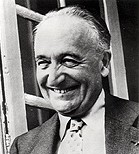 For my own part, I have to admit that I’ve cracked
For my own part, I have to admit that I’ve cracked 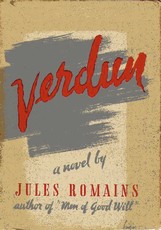 It is true that I haven’t read every one of its 4,256 pages, having sometimes been overcome with yawns in the middle of Jerphanion’s arch and soulful letters to his fellow student Jallez. On the other hand, I have read every word of Vols. I, II, III, IV (in French and English), VIII, and the greater part of Vols. V, VI, and VII. The eight volumes stand before me as I write — 612 cubic inches of reading matter, fully indexed, with more than half again as much to follow. Yet I can’t convince myself that this is a work that belongs somewhere between the “Comedie Humaine” and “Remembrance of Things Past.” I can’t convince myself that it ranks much above ordinary novels in any quality except sheer size.
It is true that I haven’t read every one of its 4,256 pages, having sometimes been overcome with yawns in the middle of Jerphanion’s arch and soulful letters to his fellow student Jallez. On the other hand, I have read every word of Vols. I, II, III, IV (in French and English), VIII, and the greater part of Vols. V, VI, and VII. The eight volumes stand before me as I write — 612 cubic inches of reading matter, fully indexed, with more than half again as much to follow. Yet I can’t convince myself that this is a work that belongs somewhere between the “Comedie Humaine” and “Remembrance of Things Past.” I can’t convince myself that it ranks much above ordinary novels in any quality except sheer size.
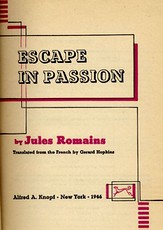 Once I returned to Varsity after Christmas I lost no time in starting upon volume one. In this book alone I met about sixty characters, most of whom appeared throughout the series. On and on I went. I paused for the Easter exams; and then while I sought volume four, missing at
Once I returned to Varsity after Christmas I lost no time in starting upon volume one. In this book alone I met about sixty characters, most of whom appeared throughout the series. On and on I went. I paused for the Easter exams; and then while I sought volume four, missing at 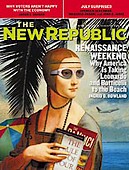
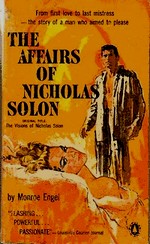
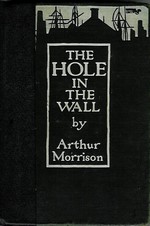
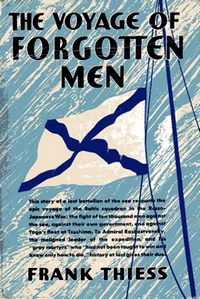

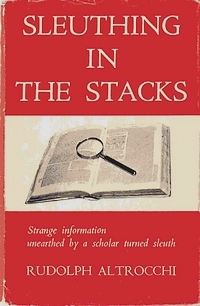
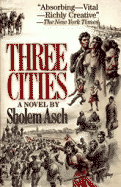
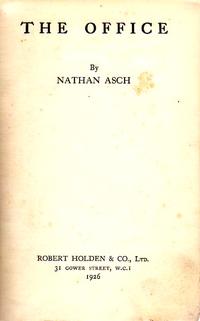
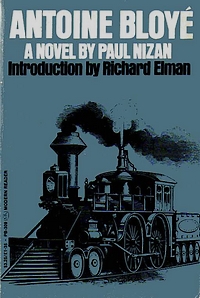 Antoine left with two stretchers, their bearers silent. They went on foot. In the depot at night you have to watch where you put your feet. The ground is full of traps and pitfalls, switch heads, ditches, and engines under steam, a tiny wisp of smoke coming from their stacks. Antoine was thinking. He did not take such deaths very easily. People said, “Accident at work.” And they tried to make you believe that work is a field of honor, while the company provides the widow with a pension, a niggardly pension, it parts with its pennies like a miser, it thinks that death is always overpaid; later it hires the sons of the dead and all is said.
Antoine left with two stretchers, their bearers silent. They went on foot. In the depot at night you have to watch where you put your feet. The ground is full of traps and pitfalls, switch heads, ditches, and engines under steam, a tiny wisp of smoke coming from their stacks. Antoine was thinking. He did not take such deaths very easily. People said, “Accident at work.” And they tried to make you believe that work is a field of honor, while the company provides the widow with a pension, a niggardly pension, it parts with its pennies like a miser, it thinks that death is always overpaid; later it hires the sons of the dead and all is said.